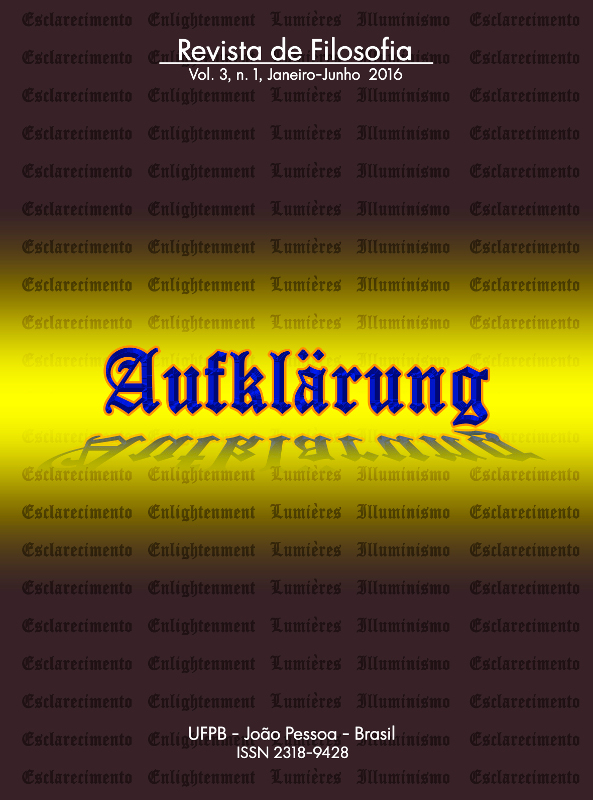Critical theory and solidarity: normative power of the social action
DOI:
https://doi.org/10.18012/arf.2016.28386Keywords:
Social Action, Solidarity, Critical TheoryAbstract
Habermas often shows the task of Critical Theory as a critical-reflexive way that is guided by social action in which underlies a particular praxis. But socially act, according to Habermas thought, it is also link subjectivity to a normative understanding and that means, in its vast critical research associate transcendental subject to social being “detranszendentalisierte” aimed at emancipated social order. This argument raises rethink not only the concept of reason, but especially put again the question of reason detranszendentalisierte Vernunft as a ground for solidarity and this because this would be, if the research is plausibel, a possible medium for social praxis whose philosophical ground is given in a conception detranszendentalisierte Vernunft.I intend to explicit the argument that the solidarity can be more than a civic task but also assume a normative task and it reveals its potential normative that is a characteristic of a Critical Theory.
Downloads
References
ASSAI, José Henrique Sousa. A Fundamentação discursiva da teoria política em Jürgen Habermas: uma abordagem empírico-normativa do Estado. Imperatriz: Ética, 2008.
_____. De “Leiden an Unbestimmtheit” à “Erfolg an Bestimmtheit”: um caminho possível da reconstrução normativa honnethiana?, Griot, Amargosa (Bahia), v. 11, n.1, 2015.
_____. Solidariedade como pressuposto de uma ontologia social: investigação possível para uma Teoria Crítica? In: BAVARESCO, Agemir, LIMA, Francisco Jozivan, ASSAI, José Henrique (org). Estudos de Filosofia Social e Política: Justiça e Reconhecimento. Porto Alegre: Editora Fi, 2015. 387 p. (Série Filosofia e Interdisciplinariedade)
______. A ontologia social “fraca” em Habermas: o déficit normativo do mundo da vida (Lebenswelt), Intuitio, Porto Alegre, v. 7, n. 1, 2014, p. 215 – 225.
BAYERTZ, Kurt (org.). Solidarity. London: Kluwer Academic Publishers, 1999. 350 p. (Philosophical Studies in Contemporary Culture).
BILLMANN, Lucie, HELD, Josef (org.). Solidarität in der Krise: Gesellschaftliche, soziale und individuelle Voraussetzungen solidarischer Praxis. Wiesbaden: Springer Verlag, 2013. 375 p.
BODE, Ingo. Die Organisation der Solidarität: Normative Interessen-organisationen der französischen Linken als Auslaufmodell mit Zukunft. Opladen: Westdeutscher Verlag, 1997. 366 p. (Studien zur Sozialwissenschaft Band 181).
BRUNKHORST, Hauke. Solidarität: Von der Bürgerfreundschaft zur globalen Rechstgenossenschaft. 1 ed. Frankfurt am Main: Suhrkamp Verlag, 2002. 246 p.
DEPENHEUER, Otto. Staatssanierung durch Enteignung?: Legitimation und Grenzen staatlichen Zugriffs auf das Vermögen seiner Bürger. Berlin: Springer Verlag, 2014. 101 p.
______. Solidarität im Verfassungsstaat: Grundlegung einer normativen Theorie der Verteilung. Norderstedt: Books on Demand, 2009. 396 p.
______. (org.). Öffentlichkeit und Vertraulichkeit: Theorie und Praxis der politischen kommunikation. Wiesbaden: Westdeutscher Verlag, 2001. 198 p.
DETEL, Von Wolfang. Grundkurs Philosophie: Philosophie des Sozialen. Stuttgart: Reclam, 2013. 191 p. (Band 5).
FORST, Rainer. Normativität und Macht: Zur Analyse sozialer Rechtfertigungs ordnungen. 1. ed. Berlin: Suhrkamp Verlag, 2015. 254 p.
______. Das Recht auf Rechtfertigung: Elemente einer konstruk-tivistischen Theorie der Gerechtigkeit. 1. ed. Frankfurt am Main: Suhrkamp Verlag, 2007. 413 p.
______. Kontexte der Gerechtigkeit: Politische Philosophie jenseits von Liberalismus und Kommunitarismus. Frankfurt am Main: Suhrkamp Verlag, 1996. 480 p.
FORST, Rainer, HARTMANN, Martin, JAEGGI, Rahel et.al. Sozialphilosophie und Kritik. 1. ed. Frankfurt am Main: Suhrkamp Verlag, 2009. 738 p.
HABERMAS, Jürgen. Im Sog der Technokratie: Kleine Politische Schriften XII. Berlin: Suhrkamp Verlag, 2013. 193 p.
______. Nachmetaphysisches Denken II: Aufsätze und Repliken. 1 ed. Berlin: Suhrkamp Verlag, 2012. 334p.
______. Das Politische – Der vernünftige Sinn eines zweifelhaften Erbstücks der Politischen Theologie. p. 28 – 52. In: MENDIETA, Eduardo, ANTWERPEN, Jonathan Van (org.). Religion und Öffentlichkeit. 1. ed. Berlin: Suhrkamp Verlag, 2012. 194 p.
______. Sprachtheoretische Grundlegung der Soziologie. 1. ed. Frankfurt am Main: Suhrkamp Verlag, 2009. 410 p. (Philosophische Texte Band 1)
______. Ach, Europa: Kleine Politische Schriften XI. 1. ed. Frankfurt am Main: Suhrkamp Verlag, 2008. 191 p
______. Entre Naturalismo e Religião: Estudos Filosóficos. Tradução de Flávio Beno Siebeneichler. Rio de Janeiro: Tempo Brasileiro, 2007. 400 p.
______. Kommunikatives Handeln und detranszendentalisierte Vernunft. Stuttgart: Reclam, 2001, 87 p.
______. Theorie des Kommunikativen Handelns: Zur Kritik der funktio-nalistischen Vernunft. Frankfurt am Main: Suhrkamp Verlag, 1997. 640 p. 2v.
______. Vorstudien und Ergänzungen zur Theorie des Kommunikativen Handelns. 1. ed. Frankfurt am Main: Suhrkamp Verlag, 1995. 606 p.
______. Die Nachholende Revolution: Kleine Politische Schriften VII. Frankfurt am Main: Suhrkamp Verlag, 1990. 224 p.
HONNETH, Axel. Sofrimento de Indeterminação: uma reatualização da Filosofia do direito de Hegel. Tradução Rúrion Soares Melo. São Paulo: Esfera Pública, 2007. 145 p.
______. Leiden an Unbestimmtheit: Eine Reaktualisierung der Hegelschen Rechtsphilosophie. Stuttgart: Reclam, 2001, 127 p.
HORKHEIMER, Max. Traditionelle und kritische Theorie. Disponível em: <http://lesekreis.blogsport.de/images/MaxHorkheimerTraditionelleundkritischeTheo-rie.pdf >. Acesso em: 4 nov. 2015.
JAEGGI, Rahel, WESCHE, Tilo (org.). Was ist Kritik? 3. ed. Frankfurt am Main: Suhrkamp Verlag, 2013. 375 p.
SCHWAN, Gesine. Weil Europa sich ändern muss: Im Gespräch mit Hauke Brunkhorst. Frankfurt: Springer Fachmedien. 2015, p. 83 – 118
SOUZA, Jessé (org.). Democracia hoje: novos desafios para a teoria demo-crática contemporânea. Brasília, UNB, 2001. 408 p.
TRANOW, Ulf. Das Konzept der Solidarität: Handlungstheoretische Fundie-rung eines soziologischen Schlüsselbegriffs. Wiesbaden: Springer Verlag, 2012. 262 p.
Additional Files
Published
How to Cite
Issue
Section
License
Journal general policy
1.This journal works under a Creative Commons License aplied to online journals. That icence can be read in the following link: Creative Commons Attribution 4.0 International (CC BY 4.0).
2.Accordingly to this License, a)the journal declares that authors hold the copyright of their articles without restrictions, and they can archieve them as post-print elsewhere. b)the journal allow the author(s) to retain publishing rights without restrictions.
Metadata Policy for information describing items in the repository
1. Anyone may access the metadata free of charge at anytime.
2.The metadata may be re-used in any medium without prior permission, even commercial purposes provided the OAI Identifier or a link to the original metadata record are given, under the terms of a CC BY license refered for the Journal.







































